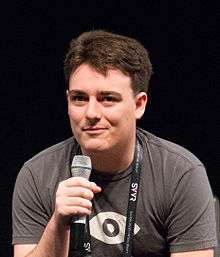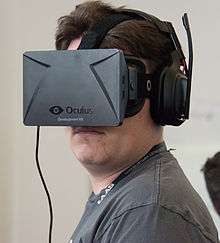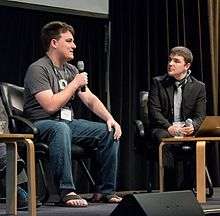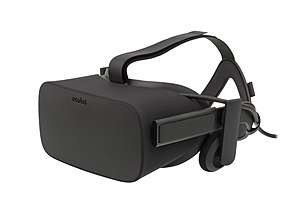Palmer Luckey
| Palmer Luckey | |
|---|---|
 Luckey at SVVR 2014 | |
| Born |
Palmer Freeman Luckey September 19, 1992 Long Beach, California, U.S.[1] |
| Nationality | American |
| Education | California State University, Long Beach |
| Occupation | Founder of Oculus VR |
| Known for | Founder of Oculus VR and designer of Oculus Rift |
| Net worth | US$730 million (2015)[2] |
Palmer Freeman Luckey (born September 19, 1992) is an American entrepreneur. He is the founder of Oculus VR and designer of the Oculus Rift, a virtual reality head-mounted display.[3] Luckey ranks #22 on Forbes' 2016 list of America's richest entrepreneurs under 40.[4]
Early life
Luckey was born and raised in Long Beach, California,[1] with three younger sisters.[5] His father worked at a car dealership.[6]
As a child he was homeschooled by his mother, took sailing lessons,[7] and had an intense interest in electronics and engineering.[3][8] He took community college courses at Golden West College and Long Beach City College[5] beginning at the age of 14 or 15, and started attending courses at California State University, Long Beach[1] in 2010.[6] He wrote and served as Online Editor for the university's student-run newspaper, Daily 49er.[9]
During his childhood and teenage years, he experimented with a variety of complex electronics projects including coil guns, Tesla coils, and lasers.[1] He built a PC gaming "rig" costing tens of thousands of U.S. dollars[8] with an elaborate six-monitor setup.[10]
He had an intense interest in virtual reality (VR), and built an extensive private collection of over 50 different head-mounted displays.[1][6][8][11] To fund these projects, he earned at least US$36,000 by fixing and reselling damaged iPhones[1] and working part-time as a groundskeeper, youth sailing coach, and computer repair technician.[5]
In 2009, he founded the ModRetro Forums with a friend, creating an online community for "portabilization", a hobby that revolves around turning old hardware devices such as game consoles and PCs into self-contained portable units mixing new and old technology.[12]
He later attended California State University, Long Beach, where he majored in journalism. During his time there, he worked as a part-time engineer at the Mixed Reality Lab (MxR)[13] at the Institute for Creative Technologies (ICT) at the University of Southern California as part of a design team for cost-effective virtual reality.[1]

Development and growth of the Oculus Rift

Luckey was frustrated with the inadequacy of the existing head-mounted displays in the market, which suffered from low contrast, high latency, low field-of-view, high cost, and extreme bulk and weight. In response, he started experimenting with his own designs in 2009. He completed his first prototype, called PR1, at age 17 in his parents’ garage in 2010,[6] which featured a 90-degree field of view, low latency, and built-in haptic feedback.
Luckey developed a series of prototypes exploring features like 3D stereoscopy, wireless, and extreme 270-degree field-of-view, while also decreasing size and weight of his systems. He shared regular updates on his progress on MTBS3D, a forum frequented by a small number of virtual reality enthusiasts.[8] His 6th-generation unit was named the "Rift", intended to be sold as a do-it-yourself kit on Kickstarter crowdfunding website to fellow enthusiasts.[8][14] He first started Oculus VR in order to facilitate the official launch of the Kickstarter campaign.[6]

John Carmack of id Software, a notable game developer famous for his work on the Doom and Quake videogame series, requested a prototype headset and used it to demonstrate a modified version of id Software's Doom 3 BFG Edition on the device at the Electronic Entertainment Expo 2012. With the resulting attention of thousands of people suddenly drawn to the Rift, Luckey dropped out of university to focus on it full-time.[6]
He showed an early prototype to Brendan Iribe, a former executive of Gaikai and Scaleform, who described it as "dangling wires and circuit boards and duct tape and hot glue all over the place" and invested "a few hundred thousand" U.S. dollars in the Rift's Kickstarter campaign.[1] Iribe later joined as Oculus VR's CEO, and Michael Antonov (former CTO of Scaleform) joined as chief software architect. Luckey also demoed the unit to Valve, and received Kickstarter endorsements from Valve's managing director Gabe Newell and prominent veteran Michael Abrash (now Chief Scientist at Oculus VR). During the Kickstarter campaign, Luckey demoed the Rift to gamers and the press at many gaming conventions, including PAX, Gamescom, and QuakeCon 2012.[6]
The Kickstarter campaign was successful, raising US$2.4 million, or 974% of its original target.[6] As a result, Oculus VR expanded, taking on more employees and a larger office space, but Luckey described his day-to-day process as not having "changed all that much," remaining a "slow plod towards making this thing a reality."[6] After launching DK1, Luckey continued to work on all aspects of the business, saying, “I have my hands in everything, from product engineering to game development to marketing,” [15] Later, he shifted his focus towards virtual reality input hardware, calling it his "pet project".[16]
Oculus VR was acquired by Facebook in March 2014 for US$3 billion,[17] and although his share is not public, Forbes magazine estimated the founder's net worth to be $700 million in 2015.[7] He continued to work at Oculus VR on core VR technology until March 2017.[18][19]
Public image
Luckey has become "the face of virtual reality in gaming"[6] and a celebrity among virtual reality enthusiasts; however, he doesn't consider himself to be a celebrity.[18] He has a casual appearance: he is frequently barefoot, and prefers sandals to shoes even at trade shows and events.[7][8]
Luckey lives in a shared house with several others where they regularly play multiplayer videogames, and he typically wears casual clothes like shorts, T-shirts, Hawaiian shirts and sandals.[20]
The character Keenan Feldspar, played by Haley Joel Osment, who appeared on several episodes of the HBO TV show Silicon Valley in 2017, was speculated by some to be based on Luckey.[21] Like Luckey, Feldspar is a young entrepreneur who became rich after selling his virtual reality technology, and who tends to wear Hawaiian shirts.[22]
Award
In 2014, Luckey was the recipient of Smithsonian Magazine's American Ingenuity Award in the Youth category.[23]
In 2016, Luckey was awarded the Royal Photographic Society Progress medal and Honorary Fellowship, which is awarded in recognition of any invention, research, publication or other contribution which has resulted in an important advance in the scientific or technological development of photography or imaging in the widest sense.[24]
Political views
Libertarianism
In September 2016, Luckey stated he is a libertarian who supported Libertarian Party politicians like Ron Paul and Gary Johnson in the past.[25][26][27]
Support of Donald Trump and boycott backlashes
In 2016, it was reported that Luckey had donated $10,000 to Nimble America, a pro-Donald Trump group that ran a billboard campaign displaying 2016 presidential candidate Hillary Clinton with the caption "Too Big To Jail".[28][29][30][31]
This caused a number of developers to temporarily cancel plans to support Oculus, including Scruta Games, which announced it would cancel Oculus's support in their games unless Luckey stepped down.[32] Scruta Games then reversed itself and announced they would resume work on Oculus Touch support, announcing it had "failed to find any evidence backing up the Daily Beast's claim that Luckey paid for hate speech".[33] Tomorrow Today Labs, developers of Newton VR, said they would not support the Oculus touch as long as Luckey is employed by Oculus.[32] Tomorrow Today Labs also reversed itself, with the company later announcing it would work with Oculus.[34]
Political donations
During 2017, Luckey donated to the re-election campaigns of Ted Cruz, Dana Rohrabacher, Steve King, Darrell Issa, Jeff Denham, Mimi Walters, Steve Knight, Kevin McCarthy and Ed Royce, as well as the California Republican Party, the National Republican Congressional Committee, and Mike Pence's Great America Committee.[35]
Departure from Facebook
In March 2017, Palmer Luckey left Facebook. No explanation for the departure was given by either party.[36][37] When asked about Luckey's departure in testimony before the U.S. Senate in April 2018, Facebook CEO Mark Zuckerberg seemed to confirm that Luckey had been fired, but stated that "it was not because of a political view".[38]
References
- 1 2 3 4 5 6 7 8 Martens, Todd (June 8, 2013). "Palmer Luckey's Oculus Rift could be a virtual reality breakthrough". Hero Complex: Pop Culture Unmasked. Los Angeles Times. Retrieved June 15, 2014.
- ↑ "Palmer Luckey profile". forbes.com. Retrieved May 15, 2017.
- 1 2 Freeman, Lary. "Oculus Rift Kickstarter campaign: comment by grandfather". Retrieved June 15, 2014.
- ↑ "#26 Palmer Luckey". forbes.com. Retrieved January 21, 2016.
- 1 2 3 4 Lang, Ben (October 16, 2012). "Q&A With Palmer Luckey, Creator of the Oculus Rift". Road to VR. Retrieved June 21, 2014.
- 1 2 3 4 5 6 7 8 9 10 Purchese, Robert (July 11, 2013). "Happy Go Luckey: Meet the 20-year-old creator of Oculus Rift". Eurogamer.net. Retrieved June 15, 2014.
- 1 2 3 Whitehouse, Kaja (March 26, 2014). "Oculus founder, just 21, 'never imagined' $2B Facebook deal". New York Post. Retrieved June 19, 2014.
- 1 2 3 4 5 6 7 Peckham, Matt (May 20, 2014). "The Inside Story of Oculus Rift and How Virtual Reality Became Reality". Wired. Retrieved June 15, 2014.
- ↑ "Daily 49er". Daily 49er. Retrieved September 8, 2014.
- ↑ Graham, Jefferson (2014). "The real world of Oculus VR founder Palmer Luckey". USA TODAY. Retrieved June 19, 2014.
- ↑ Headsets in his collection include the Vuzix iWear VR920, eMagin Z800 3DVisor,[8] Fakespace Push, Liquid Image Corporation MRG2, Visionics LVES, and a heavily modified Sony HMZ-T1.[5]
- ↑ Wang, Jennifer. "America's Richest Self-Made Entrepreneurs In Their 20s". forbes.com. Retrieved May 24, 2017.
- ↑ Mixed Reality Lab (MxR)
- ↑ Luckey, Palmer (August 21, 2009). "Oculus "Rift" : An open-source HMD for Kickstarter". MTBS3D. Retrieved June 19, 2014.
- ↑ Wang, Jennifer. "America's Richest Self-Made Entrepreneurs In Their 20s".
- ↑ "VR Input is Palmer Luckey's 'pet project'". VRFocus.
- ↑ "Oculus cost $3B not $2B, Zuckerberg says in trial".
- 1 2 "Palmer Luckey on Palmer Luckey: A VRFocus Interview". VRFocus. June 4, 2014. Retrieved June 19, 2014.
- ↑ Orland, Kyle (30 March 2017). "Oculus co-founder Palmer Luckey leaves Facebook". Ars Technica. Retrieved 30 March 2017.
- ↑ Ewalt, David (January 19, 2015). "Palmer Luckey: Defying Reality". forbes.com. Forbes. Retrieved February 1, 2017.
- ↑ Stone, Zara (June 12, 2017). "How HBO's 'Silicon Valley' Perfectly Skewers The VR Unicorn In The Form Of Haley Joel Osment". Forbes.
- ↑ Alexander, Julia (May 30, 2017). "Silicon Valley's new, young VR genius feels kind of familiar". Polygon.
- ↑ "2014 American Ingenuity Award Winners". Smithsonian Magazine. Smithsonian. Retrieved 12 October 2018.
- ↑ "Progress Medal". Royal Photographic Society. Retrieved March 7, 2017.
- ↑ "Oculus Co-Founder Palmer Luckey Denies He Supports Donald Trump's Campaign". Fortune. 2016-09-24.
- ↑ "Facebook millionaire Luckey aligns himself with alt-right, but only if you squint". USA Today. 2016-09-26.
- ↑ Luckey, Palmer Freeman (2016-09-23). "I am deeply sorry that my actions are... - Palmer Freeman Luckey". Facebook.
- ↑ Gideon Resnick; Ben Collins (September 23, 2016). "Palmer Luckey: The Facebook Near-Billionaire Secretly Funding Trump's Meme Machine". Retrieved February 3, 2017.
- ↑ "Facebook's $2 billion bet on the future is in jeopardy because of Palmer Luckey". yahoo.com. Retrieved May 15, 2017.
- ↑ Hern, Alex (September 23, 2016). "Oculus Rift founder Palmer Luckey spends fortune backing pro-Trump 'shitposts'". theguardian.com.
- ↑ "Oculus founder admits he gave $10,000 to Nimble America". usatoday.com. Retrieved February 3, 2017.
- 1 2 Gibbs, Samuel (September 27, 2016). "VR developers turn against Oculus Rift over founder's pro-Trump support". theguardian.com.
- ↑ Kosoff, Maya (September 2016). "Oculus Founder Does Damage Control After Outing Himself as Pro–Trump Donor". vanityfair.com. Retrieved February 3, 2017.
- ↑ Tomorrow Today Labs (2016-10-26). "Business and politics". Medium.com. Retrieved 2017-02-05.
- ↑ "Transaction Query By Individual Contributor". FEC. Retrieved April 11, 2018.
- ↑ Alex Hern (2017-03-31). "Palmer Luckey: Trump-supporting Oculus founder leaves Facebook". The Guardian. Retrieved 2017-08-08.
- ↑ Nick Wingfield (2017-08-08). "The Culture Wars Have Come to Silicon Valley". The New York Times. Retrieved 2017-08-08.
- ↑ Robertson, Adi (April 10, 2018). "Mark Zuckerberg says he didn't fire Palmer Luckey out of anti-conservative bias". The Verge.
External links
